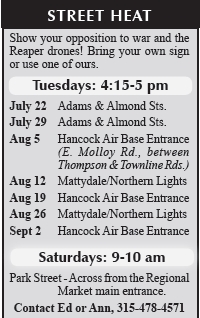IT IS HEREBY ORDERED that the above defendant, [name], observe the following conditions of behavior:
Stay away from Earl A. Evans; the home of Earl A. Evans; the school of Earl A. Evans; the business of Earl A. Evans; the place of employment of Earl A. Evans;
Refrain from communication or any other contact by mail, telephone, e-mail, voice-mail, or other electronic or any other means with Earl A. Evans;
Refrain from assault, stalking, harassment, aggravated harassment, menacing, reckless endangerment, strangulation, criminal obstruction of breathing or circulation, disorderly conduct, criminal mischief, sexual abuse, sexual misconduct, forcible touching, intimidation, threats or any criminal offense or interference with the victim… .
These words are from the order of protection issued by Town of DeWitt Justices to all nonviolent civil resisters arrested at Hancock Air Base since October, 2012. Beginning in May, 2014, new language was added to allow those with orders to participate in legally permitted activities at the base. About 50 activists are currently subject to orders of protection. Col. Evans is Hancock’s mission support group commander.

MQ-9 Reaper drones (weaponized, unmanned aerial vehicles) came to Hancock Air National Guard Base near Syracuse in late 2009. The base quickly became a hub of Reaper activity, piloting Reapers flying over Afghanistan and training drone pilots, sensor operators and maintenance technicians. Protests at Hancock began almost immediately. April, 2011 saw the first mass nonviolent civil resistance action, resulting in 38 arrests.
The First OOPs
In 2012, the number of smaller actions stepped up and in October, the Hancock 17 were issued temporary orders of protection (OOPs). While being arraigned, the nonviolent activists were each read the order to protect Col. Evans and were stunned. No one knew him, what he looked like, or where he lived, and certainly no one had ever stalked or threatened him.
It was clear that the goal was to keep them away from Evans’ “place of business,” aka Hancock Air Base. In a perversion of justice, the commander of the base, inside miles of fencing defended by armed guards, obtained an order of protection against nonviolent activists, while families in Pakistan, Afghanistan, Somalia, Yemen and elsewhere remain unprotected against US drone strikes.
Since then, everyone arrested at Hancock actions has received a temporary order of protection—temporary in that it is in effect until trial. Since a few trials have been scheduled two years after an action, those temporary orders will have been in effect for two years. Then, if the resister is found guilty, he/she may receive an OOP for another two years.
Challenging the OOP
It is critical to challenge this use of OOPs to suppress dissent, with the threat of one year in prison if the order is violated. There is grave concern that this technique may spread. For example, an Ithaca area anti-fracking activist was issued an OOP to stay away from Inergy’s local manager (someone he’s never met) and his place of business (a proposed gas storage facility).
A March 2014 ruling by Acting Justice of the Supreme Court Brunetti vacated the OOP of Hancock drone resister Dan Finlay. While the District Attorney’s office appeals the ruling, OOPs continue to be reissued, including to Dan.

Meanwhile, Ithacan Mary Ann Grady Flores was recently found guilty of violating her OOP. She was sentenced to 12 months in prison for unintentionally violating it while photographing an action at the base, whose participants, ironically, were all acquitted. She is appealing her case.
People’s Order of Protection
As important as it is to challenge the use of OOPs to suppress dissent, we cannot forget the reason for protesting at the base. Upstate Drone Action’s recent march called “Peoples’ Orders of Protection Against Drone Terror” focused on who really needs an OOP. Raz Mohammad sent this plea from Afghanistan:
On Friday the 30th of May, 2008, my brother-in-law was killed by a drone along with four of his friends. My brother-in-law was a student and he was innocent. Accountability from the US Military for this incident was non-existent.
The incident created a situation which was beyond imagination. It affected the minds of my sister and all members of my family. When my nephew was five years old, he asked his mother “Where is father?” My sister replied “He was killed by a computer.” These negative effects persist on all of us to this day. I am worried for my family and for the people of Maidan Shahr. I request that the United States courts protect my family and my village.
If the courts won’t do it, all of us working together will.





